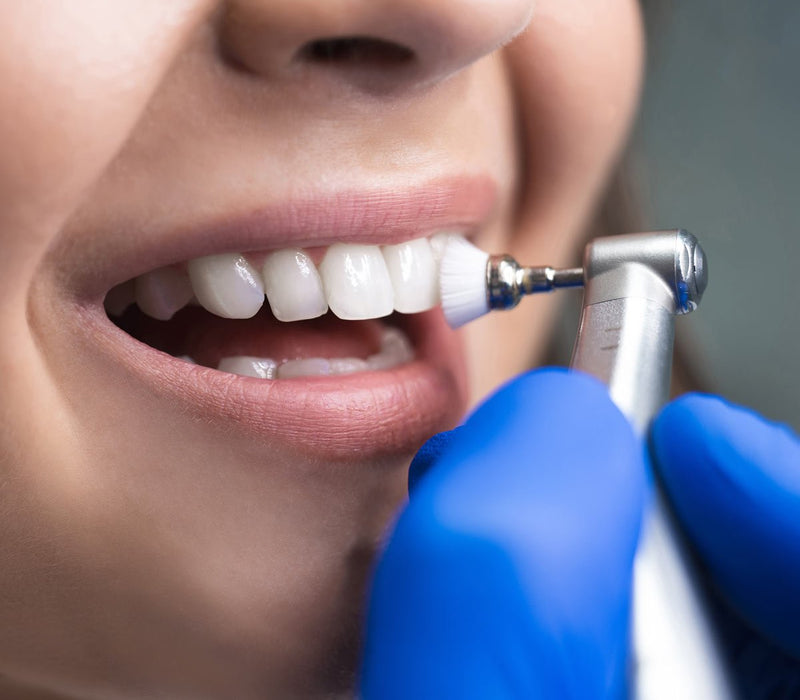Preliminary: Why Oral Hygiene During Pregnancy is So Important
Good oral hygiene is important at all times, but it’s especially crucial during pregnancy. Hormonal changes make expectant mothers more prone to dental problems like cavities and gum infections. These changes loosen tissues in the body, including in the mouth, making it easier for harmful bacteria to enter through the gums, leading to inflammation and bleeding.
In addition, bacteria from the mouth can enter the bloodstream and be transmitted to the baby – a process known medically as bacteremia.
Scientific studies have shown that the risk of premature birth is about seven times higher if the expectant mother suffers from periodontitis (inflammation of the tooth-supporting structures) during pregnancy.
That’s why it’s essential to maintain thorough oral hygiene from now on (if you haven’t already). It’s recommended that pregnant women have two professional cleanings during their pregnancy, ideally one after the 13th week and again between the 25th and 35th weeks.
Why Is Oral Hygiene During Pregnancy So Important?
During pregnancy, the body undergoes numerous hormonal changes that affect not only the entire body but also the condition of the teeth and gums. Specifically, the loosening of tissues in the body – including the gums – is influenced by pregnancy hormones. This makes the gums more susceptible to inflammation and bleeding, and bacteria in the mouth can more easily penetrate the gums.
This process is called bacteremia, and it can result in harmful bacteria being transmitted to the unborn child through the bloodstream. This can not only increase the risk of dental issues for the mother but also have adverse effects on the baby.
Scientific research has also shown that periodontitis, an advanced form of gum disease, significantly increases the risk of preterm birth. The risk of premature birth is seven times higher if the expectant mother suffers from periodontitis during pregnancy. This highlights how closely linked dental health is to the health of both the mother and the baby.
How to Optimize Your Oral Hygiene During Pregnancy
1. Regular Brushing and Use of Dental Floss
The foundation of good oral hygiene remains the same: Brush your teeth twice a day with fluoride toothpaste and use dental floss. Dental floss helps remove plaque and bacteria from areas that are difficult to reach with a toothbrush.
2. Mouthwashes and Antibacterial Care Products
In addition to brushing, an antibacterial mouthwash can help reduce bacteria in the mouth. During pregnancy, it’s important to choose gentle, alcohol-free products that won’t irritate the gums. These mouthwashes help minimize inflammation and plaque buildup.
3. Professional Dental Cleanings
It’s recommended to have two professional dental cleanings during pregnancy. The ideal time for these appointments is after the 13th week and again between the 25th and 35th weeks. The dentist can remove stubborn plaque and ensure that the gums remain healthy.
4. A Balanced Diet
Diet also plays a crucial role. Avoid sugary snacks and drinks, as these can increase the risk of cavities and gum inflammation. Instead, focus on a balanced diet with vitamins and minerals that strengthen the gums and teeth.
Q&A: Frequently Asked Questions About Oral Hygiene During Pregnancy
Hormonal changes during pregnancy cause the tissue, including the gums, to loosen. This makes the gums more susceptible to inflammation and bleeding, which can lead to gum problems.
It’s recommended to visit the dentist at least twice during pregnancy for professional teeth cleanings. The first appointment should ideally be after the 13th week and again between the 25th and 35th week.
Yes, most dental treatments are safe during pregnancy. However, it’s important to inform your dentist about your pregnancy, especially if treatments such as X-rays or anesthesia are necessary. The dentist can adjust the treatment accordingly.
If left untreated, periodontitis can significantly increase the risk of preterm birth. It’s essential to recognize and treat this condition early. Regular oral care and professional dental cleanings are crucial to minimize this risk.
Conclusion: Oral Hygiene as Part of a Healthy Pregnancy
Maintaining optimal oral hygiene during pregnancy is not only important for the mother’s health but also for the baby’s well-being. By brushing your teeth regularly, using antibacterial products, and having professional cleanings, you can significantly reduce the risk of dental problems and premature birth. Oral health should therefore be an integral part of your pregnancy care plan.




